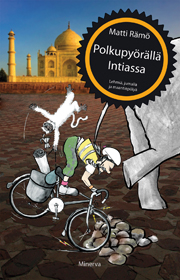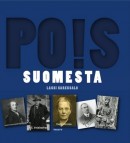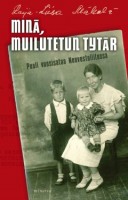Archive for July, 2010
Matti Rämö: Polkupyörällä Intiassa. Lehmiä, jumalia ja maantiepölyä [Cycling in India. Cows, gods, and road dust]
30 July 2010 | Mini reviews, Reviews
 Polkupyörällä Intiassa. Lehmiä, jumalia ja maantiepölyä
Polkupyörällä Intiassa. Lehmiä, jumalia ja maantiepölyä
[Cycling in India. Cows, gods, and road dust]
Helsinki: Minerva Kustannus Oy, 2010. 301 p., ill.
ISBN 978-952-492-335-4
€ 27.90, hardback
The author decides to take a pinch of the ashes of his dead mother to India’s Varanasi, the city of pilgrims on the banks of the Ganges, and at the same time visit his daughter at an international high school on the country’s west coast. Rämö takes his bicycle on the plane to Delhi and in the course of a month cycles more than 2,600 kilometres, from Delhi to Mumbai. The cyclist is challenged by the heat and humidity, the chaotic traffic, the awkward sections of road and the endless thirst for knowledge on the part of curious bystanders – but his observations are deeper than those of the average travel author, as he worked in India in third world research during the 1980s and 1990s. In the summer of 2007 he completed a four months’ cycle tour of the Sahara, travelling some 9,600 kilometres, and published a book about his experiences (Rengasrikkoja Saharassa, ‘Punctures in the Sahara’, Minerva, 2008). In spite of the shorter length of the Indian journey, the author thinks it possessed a higher difficulty factor.
Lassi Saressalo: Pois Suomesta [Out of Finland]
12 July 2010 | Mini reviews, Reviews
 Pois Suomesta – Suomesta paenneita, karkotettuja, väkisin vietyjä, laittomasti lähteneitä
Pois Suomesta – Suomesta paenneita, karkotettuja, väkisin vietyjä, laittomasti lähteneitä
[Out of Finland – refugees, deportees, abductees, illegal emigrants]
Tampere, Traff Kustannus, 2010. 297 p.
ISBN 978-952-99079-7-7
€ 29, hardback
Dr Lassi Saressalo, head of the Finnish Local Heritage Federation, has gathered a large collection of stories about people who were deported or abducted from Finland, or who fled as refugees. The examples relate to several periods of Finland’s history, including Swedish and Russian rule and the period since independence in 1918. People have had to leave Finland at different times for different reasons: some fled the cruelty of conquerors or conscription, others were forced to leave because of their political views or patriotic aims, either on their own initiative or by the government. The most recent cases discussed in the book date from the period following the end of the Second World War. The book is accompanied by a (Finnish-language) website, which provides additional background information on the events that are described as well as a forum for discussion.
What the critic said
9 July 2010 | Letter from the Editors

Illustration by Joan Barrás
‘Pay no attention to what the critics say. A statue has never been erected in honour of a critic,’ said the Finnish composer Jean Sibelius.
No, probably not; but people still read what the critics write – and, sometimes, also what they wrote fifty or a hundred years ago.
An annual list of professions most highly valued by the public in Finland is always headed by surgeons. Shepherds generally feature at the bottom of the list. But critics fare none too well, either – a couple of years ago they were ranked between butchers and gravediggers. Which, of course, can be interpreted, in metaphorical terms, either as hilarious or tragicomical. More…
Raija-Liisa Mäkelä: Minä, muilutetun tytär. Puoli vuosisataa Neuvostoliitossa [Abductee’s daughter. Half a century in the Soviet Union]
5 July 2010 | Mini reviews, Reviews
 Minä, muilutetun tytär. Puoli vuosisataa Neuvostoliitossa
Minä, muilutetun tytär. Puoli vuosisataa Neuvostoliitossa
[Abductee’s daughter. Half a century in the Soviet Union]
Jyväskylä: Minerva, 2009. 321 p, ill.
ISBN 978-952-492-294-4
€ 24, hardback
During the period 1910-1930 many people defected from Finland to Russia/USSR both for political reasons and in the hope of better living standards. The labourite leader Yrjö Mäkelä was forcibly abducted across the border by the radical Finnish right-wing anti-Communist Lapua People’s Movement. Mäkelä’s fiancée also emigrated to the USSR, where the couple married and had two children. Raija-Liisa Mäkelä was born in Petrozavodsk, close to the Finnish border, in 1938, but never saw her father, who was interned in one of Stalin’s prisons and executed, although innocent. In the Soviet Union the Mäkelä family had both to carry the label of ‘enemy of the people’ and to endure majority (Russian) population’s antipathy towards Finns. The memoirs cover the family’s experiences from 1930 until 1990, when the author was able to move to Finland. In addition to providing evidence of remarkable survival skills, the book contains an interesting portrayal of Finnish widows and their families living in Petrozavodsk and nearby Sortavala.
